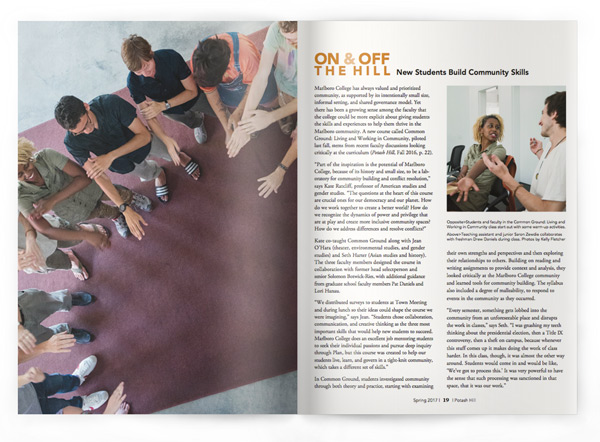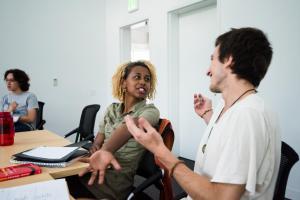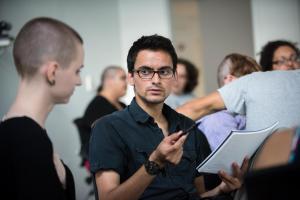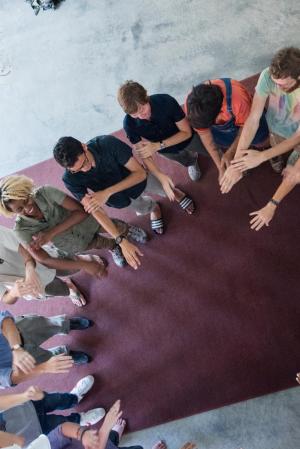New Students Build Community Skills

Marlboro College has always valued and prioritized community, as supported by its intentionally small size, informal setting, and shared governance model. Yet there has been a growing sense among the faculty that the college could be more explicit about giving students the skills and experiences to help them thrive in the Marlboro community. A new course called Common Ground: Living and Working in Community, piloted last fall, stems from recent faculty discussions looking critically at the curriculum (Potash Hill, Fall 2016).

“Part of the inspiration is the potential of Marlboro College, because of its history and small size, to be a laboratory for community building and conflict resolution,” says Kate Ratcliff, professor of American studies and gender studies. “The questions at the heart of this course are crucial ones for our democracy and our planet. How do we work together to create a better world? How do we recognize the dynamics of power and privilege that are at play and create more inclusive community spaces? How do we address differences and resolve conflicts?”
Kate co-taught Common Ground along with Jean O’Hara (theater, environmental studies, and gender studies) and Seth Harter (Asian studies and history). The three faculty members designed the course in collaboration with former head selectperson and senior Solomon Botwick-Ries, with additional guidance from graduate school faculty members Pat Daniels and Lori Hanau.
“We distributed surveys to students at Town Meeting and during lunch so their ideas could shape the course we were imagining,” says Jean. “Students chose collaboration, communication, and creative thinking as the three most important skills that would help new students to succeed. Marlboro College does an excellent job mentoring students to seek their individual passions and pursue deep inquiry through Plan, but this course was created to help our students live, learn, and govern in a tight-knit community, which takes a different set of skills.”

In Common Ground, students investigated community through both theory and practice, starting with examining their own strengths and perspectives and then exploring their relationships to others. Building on reading and writing assignments to provide context and analysis, they looked critically at the Marlboro College community and learned tools for community building. The syllabus also included a degree of malleability, to respond to events in the community as they occurred.
“Every semester, something gets lobbed into the community from an unforeseeable place and disrupts the work in classes,” says Seth. “I was gnashing my teeth thinking about the presidential election, then a Title IX controversy, then a theft on campus, because whenever this stuff comes up it makes doing the work of class harder. In this class, though, it was almost the other way around. Students would come in and would be like, ‘We’ve got to process this.’ It was very powerful to have the sense that such processing was sanctioned in that space, that it was our work.”
This work included President Kevin coming to class for a debriefing about the presidential election, a conversation that affected everyone deeply. It also contributed to a communique from Kevin to the college community about not tolerating xenophobia on campus.
“It was powerful for students to see the president show up to class and then immediately respond,” says Jean. “That they felt comfortable sharing honestly, despite him coming in, also speaks to the amount of work we did as a group. They understood that these conversations have to happen with everybody, not just in this classroom. This isn’t a rehearsal.”

“As we developed trust among the micro-community of the class, we began to cultivate a warm, inviting atmosphere,” says Solomon Botwick-Reis, who also acted as one of three teaching assistants. “The course was a transformative space of tenderness—tender vulnerability with each other, with issues in the Marlboro community, and with the broader realities of our nation and world.”
Students put theory into practice in the form of community-based projects that they designed and co-created, building on the sense of reciprocity and responsibility essential to community. These projects focused on issues around classism at Marlboro, public education about smoking, and helping art students to cover materials costs.
“I began to grasp the extent to which Marlboro students can impact their campus community,” says freshman Adeel Sultan, whose group piloted a Creative Arts Co-op where students can sell their art and help other students afford art supplies. “Coming out of that experience, I feel empowered and ready to collaborate with others on future projects that benefit the community.”
“Students learned a lot about the challenges of working together, and came to a new appreciation of the difficulty of organizing and publicizing events on campus—all of that I think was a real eye-opener to them,” says Seth. “Their project equipped students with the knowledge they need, and the tools they need, to be better community members. This included an appreciation for the work of staff, and seeing that their roles are very complicated.”
“The highlight of the class for me was the intentional way we created a community in the class itself,” says Kate. “Peter Block [author of Community: The Structure of Belonging] emphasizes the idea that community is not something that exists in a pre-formed way, but is more a way of being with ourselves and each other to create change. I was profoundly moved by the work we did together in the classroom.”
